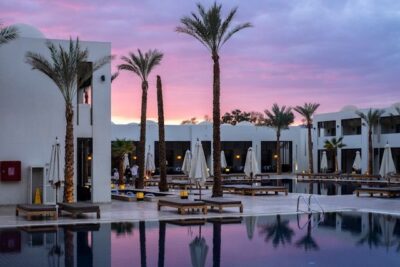In smart construction and design, durability should always go alongside them. It shouldn’t be in conflict. In other words, not only should construction ensure aesthetics, but also that the structure or interiors last a long time, especially in hospitality spaces.
For instance, in international hotels where rooms are used by various guests, not only by an individual or single family as in a residential unit, the design should be at its most durable. This is what construction experts for hospitality spaces must consistently work towards.
So, smart construction is necessary. What are the things to know about how this elevates hospitality brands? Let’s continue reading.
Smart Construction in a Nutshell
Smart construction is all about integrating the best of advanced technologies and even digital solutions into traditional construction practices with the goals of improving efficiency, safety, and overall project outcomes. It may even include using tools such as the Internet of Things, robotics, and artificial intelligence to enhance all aspects of the construction process, from project planning and design to execution and post-construction management, all of which are geared toward durability in design.
The Importance of Durability in Design for Hospitality Spaces
As their name implies, hospitality spaces are physical environments designed to provide their guests a welcoming and comfortable experience. They include hotels, resorts and casinos, restaurants, and other leisure facilities, all of which aim to create a positive and unforgettable atmosphere.
The last thing a resort and casino manager wants to see is a cushioned chair on the casino floor dismantled. When this happens, guest turnout may suffer.
Durability in hospitality space design and construction is vital for several reasons:
- Ensures the longevity of furnishings
- Contributes to a safer environment, especially in high-traffic areas
- Improves energy efficiency
- Maintains a consistent aesthetic appeal
- Prevents space from looking worn or outdated
How Durable and Smart Construction and Design Elevate Hospitality Brands
1. Designing for Now and Later Through Modular Magic
Even if you manage a luxury hotel that has been existing for several years already, you must still ensure its design is for now and later. This is made possible with modular construction techniques. It’s all about flexibility.
Modular construction techniques offer a compelling edge here. Not only do they reduce construction timelines and waste, but they also make future updates much easier. Say a hotel wants to convert standard rooms into family suites or add co-working pods to a lobby area. With modular elements, these shifts become far less disruptive and far more cost-effective.
But modular doesn’t have to mean bland or repetitive. With a bit of creativity, you can design modular spaces that still feel bespoke, layered, and unique. Custom millwork, locally sourced finishes, or regionally inspired art can add all the personality you need without sacrificing the flexibility you want.
2. Everything Must Be Sustainable
This is what shouldn’t be forgotten and set aside. As construction experts handle smart construction, sustainability must be seen along the way. Nowadays, travelers are getting more eco-conscious. They don’t want to stay in hotels that can cause harm to the environment. Thus, green building isn’t a niche trend anymore—it’s a business imperative.
Travelers can’t particularly tell, of course. So, building managers must guarantee that features like solar-steady roofing, high-performance HVAC systems, low-flow plumbing fixtures, and other sustainable strategies are in place. Plus, buildings should also be able to adhere to certifications. They’re proof of purpose.
Sustainability is a design ethos. It’s about choosing timeless over trendy, durable over disposable, and thoughtful over flashy. Wouldn’t you be proud if your hotel is labeled sustainable?
3. The Brand Strategy in Construction
No, you don’t have to be a branding expert when building your hospitality space. But, smart construction is more than just a means to an end—it’s a brand strategy. It’s about aligning your physical spaces with your brand’s promise. If your hotel brand promises “laid-back luxury,” such as what you have in places like Morocco, that should translate into both the look and the feel of the space—easy maintenance, long-lasting furnishings, and smart, resilient design solutions.
Let’s not forget that construction choices also impact staff experience. Durable, intuitive spaces reduce maintenance issues, ease operational stress, and support better guest service. A space that functions well behind the scenes functions better for the people staying in it.
Conclusion
Overall, smart construction becomes the silent partner in every guest interaction. It’s there in the smooth glide of the guestroom door. In the seamless acoustics of a private dining space. In the cool, flawless finish of a bathroom that sees a hundred uses a week and still sparkles like new.
View the original article and our Inspiration here


Leave a Reply